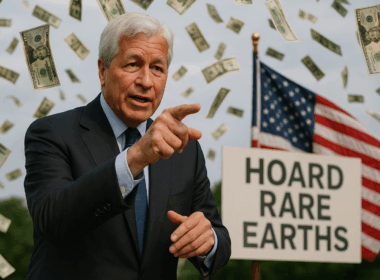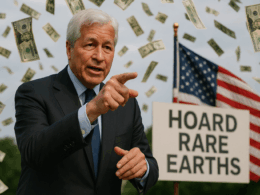Ever since we published the story “The Silver Conspiracy,” more evidence of commodities manipulation have been revealed.
Last we, we talked about the latest scandal and conspiracy of the CFTC (Commodity Futures Trading Commission) judges. Since our last newsletter (see Enron Lives On?), it seems every journalist and newsletter is now uncovering the story on commodities price manipulation.
And with good reason.
Just this past week, CFTC Commissioner Bart Chilton said there have been “repeated attempts” to influence prices (see Statement at the CFTC Public Meeting on Anti-Manipulation and Trading Practices.)
The investigation of silver price manipulation by the CFTC is now in the third year. Finally, they’re speaking out.
And it’s about to make a big splash in the markets.
CFTC Speaks Out
According to Chilton, there have been violations of the Commodity Exchange Act, stating, “There have been fraudulent efforts to persuade and deviously control that price…Any such violation of the law in this regard should be prosecuted.”
In 2008, the CFTC said in a report that it had received “numerous letters, e-mails and phone calls” during the last 20 to 25 years alleging prices were being manipulated downward.
Finally, after all those years and right before the market crash, they decide to investigate further and in particular, allegations against JP Morgan and HSBC.
Two traders have accused HSBC and JPMorgan Chase of manipulating the price of silver in separate lawsuits filed in a Manhattan federal court last Wednesday. The suits allege that the two banking giants amassed “enormous short positions,” which force the price of silver downward.
The lawsuits, filed by U.S. traders, Peter Laskaris and Brian Beatty, allege that the banks worked together on the silver futures market, advising each other know about large trades.
They claim that the banks would also place large “spoof” trading orders, which are essentially a fake order in the market that, “is not executed but influences prices and is then withdrawn before it reasonably can be executed.”
By working together to suppress silver futures, the big banks’ call options, which represent the right to buy, would decline, making their short positions more lucrative, according to Laskaris’ suit.
This type of event happens in every market, and in every exchange. But when it deals with the commodities market, it makes it that much more lucrative due to the size and liquidity of the trades.
Is JP Morgan and HSBC Guilty?
So far, the CFTC is still conducting interviews with traders at JP Morgan, HSBC, industry traders, commodity executives, experts and employees of other metals trading firms.
The verdict of whether there was any type of manipulation remains. But take a look at this:
According to a letter to the CFTC from William Murphy, chairman of the Gold Anti-Trust Action Committee, HSBC and JPMorgan Chase held 43% of the commercial net short position in gold and 68% of the commercial net short position in silver. He also said that the two banks were short 123,331 contracts but long only 523 contracts, and in silver they were short 41,318 contracts and long only 1,426 contracts.
Another case swept under the rug?
Regardless, as Chilton mentions, “the legal definition of manipulation under the law is a high bar to prove.” Attempted manipulation and other potential violations of law will be easier to prove than manipulation itself. So the fact remains, charging these banks, or any others, with criminal acts of manipulation will not only be difficult, but may not happen at all.
These aren’t the only cases of manipulation.
More Manipulation?
Just last week, it was made public that CFTC Judge Bruce Levine has been accused by his colleague, George Painter, that he would never rule in favour of investors (see Enron Lives On.)
Earlier this year, we wrote an article on the Silver Conspiracy with a short story on Andrew Maguire, a successful metals trader and whistleblower who went to the CFTC with data that strongly suggested that a small number of short sellers had rigged the markets for both silver and gold.
Maguire not only provided the regulators on how the manipulation generally worked, but also warned them of a specific scenario where the SPDR Gold Trust (NYSE:GLD) and iShares Silver Trust (NYSE:SLV) markets would be manipulated.
He told the regulators that a massive crime was about to happen, and the crime happened precisely as he predicted it would, forcing the CFTC to take a closer look.
Since then, silver has broken recent new highs. Earlier this month, silver hit $24.95 an ounce on – the highest level in 30 years.
Many traders believe this is a result of the investigation forcing the big banks to tighten up on their “spoof” trades and large short positions.
The World is “Fiat”
Earlier this year, during a CFTC hearing, Jeffrey Christian of the CPM Group said that the London Bullion Market Association (LBMA) banks have approximately 100 times more gold deposits than actual gold bullion. This means that for every ounce of gold traded in these markets, 99 of them appear from thin air. Has gold and silver been converted into a fiat currency in these markets?
What happens if everyone decides that they want actual physical delivery of their gold? What about silver? What happens when people realise that we don’t have the amount of gold, or silver, that the market says we have?
The answer is simple. Its about supply and demand. No supply and high demand will undoubtedly lead to higher prices as the world begs for more.
Short term, we may see some pullback in prices. But with interest rates remaining at record lows, evidence of price manipulation, and the fact that inflation will take time to catch up with the economy, we are going to eventually enter into a commodities bull market the likes of which we have never seen before (see The Breakout.)
Chilton said the commission should release more information on its investigation “in the very near future.”
When they do, you can bet that we’re going to see some fireworks.
Until next time,
Ivan Lo
Disclaimer and Disclosure
Equedia.com & Equedia Network Corporation bears no liability for losses and/or damages arising from the use of this newsletter or any third party content provided herein. Equedia.com is an online financial newsletter owned by Equedia Network Corporation. We are focused on researching small-cap and large-cap public companies. Our past performance does not guarantee future results. Information in this report has been obtained from sources considered to be reliable, but we do not guarantee that it is accurate or complete. This material is not an offer to sell or a solicitation of an offer to buy any securities or commodities.
Equedia.com has been compensated to perform research on specific companies and therefore information should not be construed as unbiased. Each contract varies in duration, services performed and compensation received. Equedia.com is not responsible for any claims made by any of the mentioned companies or third party content providers. You should independently investigate and fully understand all risks before investing. We are not a registered broker-dealer or financial advisor. Before investing in any securities, you should consult with your financial advisor and a registered broker-dealer. The information and data in this report were obtained from sources considered reliable. Their accuracy or completeness is not guaranteed and the giving of the same is not to be deemed as an offer or solicitation on our part with respect to the sale or purchase of any securities or commodities. Any decision to purchase or sell as a result of the opinions expressed in this report OR ON Equedia.com will be the full responsibility of the person authorizing such transaction.
Please view our privacy policy and disclaimer to view our full disclosure at http://equedia.com/cms.php/terms. Our views and opinions regarding the companies within Equedia.com are our own views and are based on information that we have received, which we assumed to be reliable. We do not guarantee that any of the companies will perform as we expect, and any comparisons we have made to other companies may not be valid or come into effect. Equedia.com is paid editorial fees for its writing and the dissemination of material and the companies featured do not have to meet any specific financial criteria. The companies represented by Equedia.com are typically development-stage companies that pose a much higher risk to investors. When investing in speculative stocks of this nature, it is possible to lose your entire investment over time. Statements included in this newsletter may contain forward looking statements, including the Company’s intentions, forecasts, plans or other matters that haven’t yet occurred. Such statements involve a number of risks and uncertainties. Further information on potential factors that may affect, delay or prevent such forward looking statements from coming to fruition can be found in their specific Financial reports.Equedia Network Corporation is a distributor (and not a publisher) of content supplied by third parties and Subscribers. Accordingly, Equedia Network Corporation has no more editorial control over such content than does a public library, bookstore, or newsstand. Any opinions, advice, statements, services, offers, or other information or content expressed or made available by third parties, including information providers, Subscribers or any other user of the Equedia Network Corporation Network of Sites, are those of the respective author(s) or distributor(s) and not of Equedia Network Corporation. Neither Equedia Network Corporation nor any third-party provider of information guarantees the accuracy, completeness, or usefulness of any content, nor its merchantability or fitness for any particular purpose.












